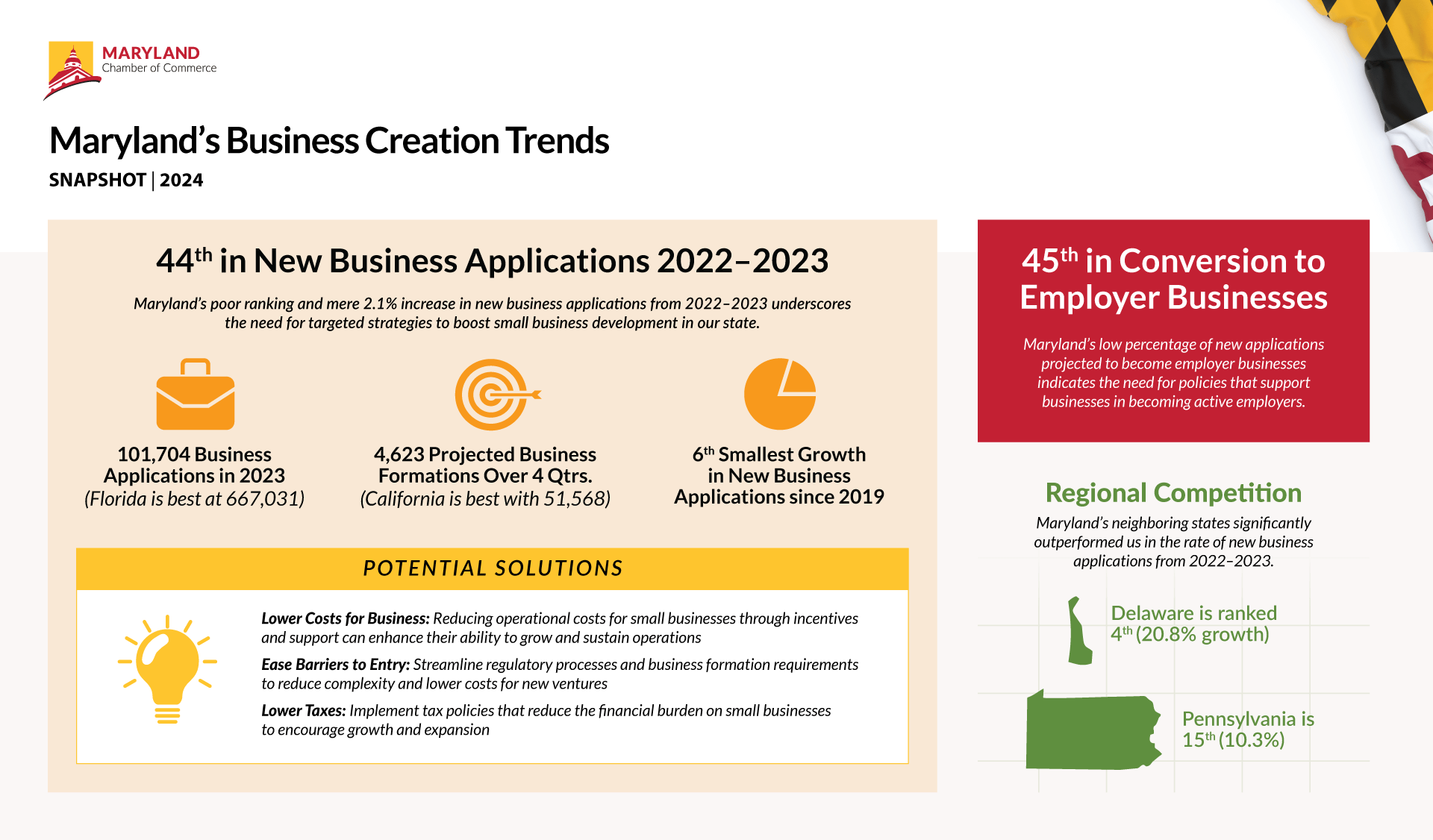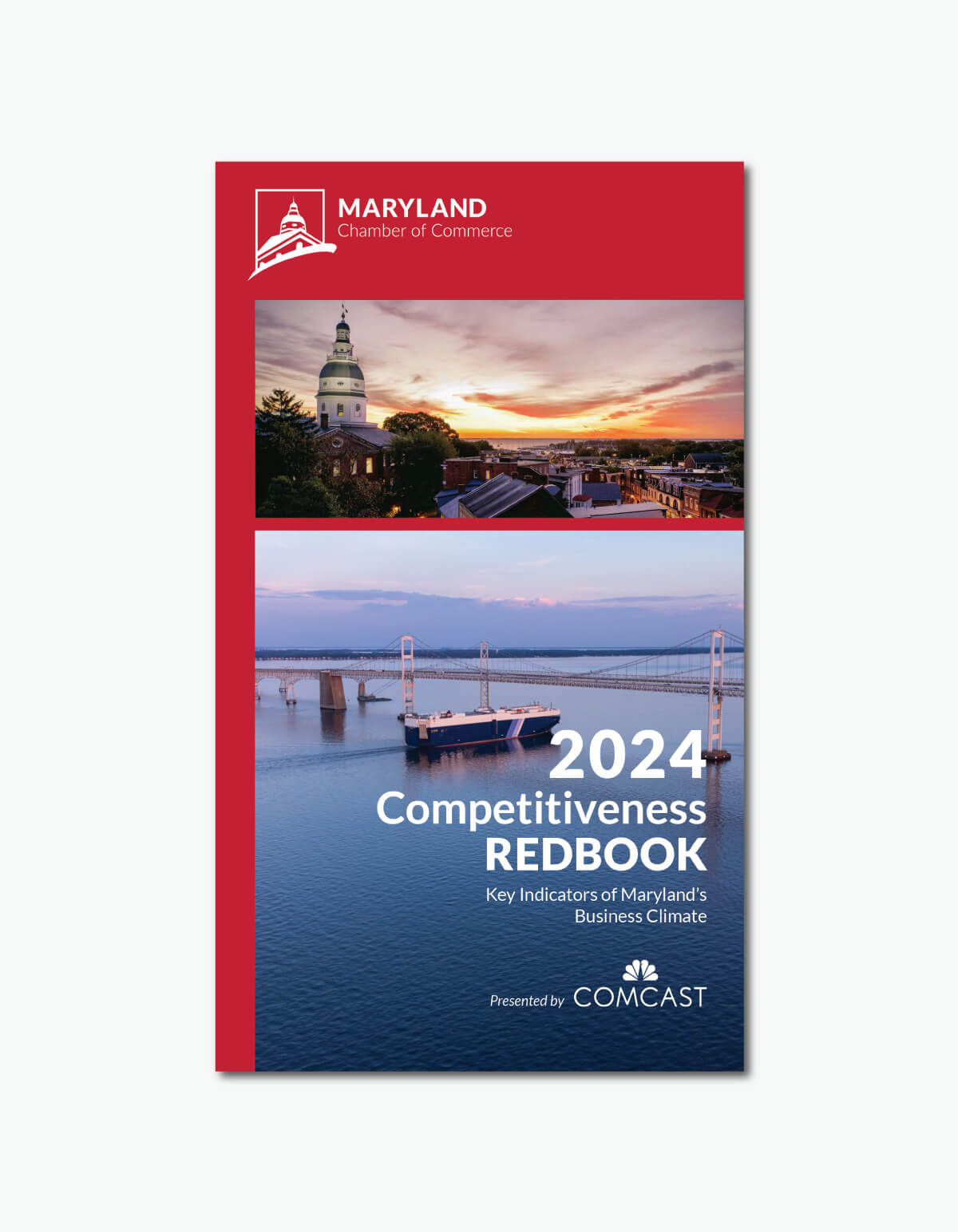Blog
Charting Maryland’s Economic Competitiveness in 2024: Business Creation
Dec 23, 2024
Examining Business Creation Trends in Maryland
Maryland's small business sector faces several challenges that affect its overall economic competitiveness. Despite the critical role small businesses play in driving job creation and economic growth, recent data highlights areas where Maryland is trailing other states.
Challenges to Competitiveness
Growth Rates: Maryland ranks 40th in the percentage change of new business applications from December 2022 to December 2023, reflecting slower growth compared to neighboring states such as Delaware (12th), Pennsylvania (13th) and Virginia (35th). For the annual comparison, Maryland ranks 44th with a 2.1% increase in new business applications from 2022 to 2023. In contrast, Delaware achieved a 20.8% growth (ranking 4th), Pennsylvania saw a 10.3% increase (ranking 15th) and Virginia experienced a 6.4% rise (ranking 28th). This data underscores the need for targeted strategies to boost small business development in Maryland.
Business Applications Per Capita: Maryland's performance in new business applications per capita ranks 16th, trailing behind Virginia (21st) and Pennsylvania (41st), and significantly behind top performers like Wyoming (50th). This suggests a need to enhance the state's appeal to new entrepreneurs.
Projected Business Formations: With 4,623 projected business formations in 2023, Maryland is outpaced by neighboring states such as Virginia (7,781) and Pennsylvania (9,817), as well as leading states like California, which is projected to have over 51,000 formations. This reflects a need for improved support and incentives for new businesses.
Conversion to Employer Businesses: Maryland ranks 45th in the percentage of new applications projected to become employer businesses, compared to Virginia (35th) and Pennsylvania (30th). Higher-performing states like Maine have significantly better conversion rates, indicating a need for policies that support businesses in becoming active employers.
Data Trends: Business Creation
| Md '23 | Va '23 | Pa '23 | De '23 | Best | |
| 2022-2023 Percentage Change in Business Applications | 44 | 28 | 15 | 4 | Wyoming |
| Percentage Change of New Business Applications Filed (Dec. 2022-Dec. 2022) | 40 | 35 | 13 | 12 | Colorado |
| New Business Applications in 2023 | 101,704 | 132,075 | 153,599 | 55,389 | Florida (667,031) |
| Ranking of 2023 Business Applications per capita | 16 | 21 | 41 | 2 | Wyoming |
| 2023 Projected Business Formations (within 4 quarters) | 4,623 | 7,781 | 9,817 | 2,294 | California (51,568) |
| Percent of Applications Projected to become Employer Businesses | 45 | 35 | 30 | 48 | Maine |
- Maryland experienced a modest 0.5% increase in new business applications from December 2022 to December 2023, ranking 39th in this metric. This growth rate is significantly lower compared to neighboring states like Delaware (12th) and Pennsylvania (13th), indicating a slower pace of new business activity.
- Maryland ranks 44th with a 2.1% increase in new business applications from 2022 to 2023. In contrast, Delaware achieved a 20.8% growth (ranking 4th), Pennsylvania saw a 10.3% increase (ranking 15th) and Virginia experienced a 6.4% rise (ranking 28th)
- Maryland is projected to have 4,623 new business formations in 2023, which is outpaced by neighboring states such as Virginia (7,781) and Pennsylvania (9,817). This suggests a need for more robust support to stimulate business creation.
- Only 4.5% of new business applications in Maryland are projected to become employer businesses, placing the state at 45th in this category. This is lower than neighboring states like Virginia (5.9%) and Pennsylvania (6.4%), and far behind top-performing Maine (11.4%), highlighting a gap in the conversion of new startups into job-creating businesses.
Working Towards a Solution
Lower Costs for Business: Reducing operational costs for small businesses through incentives and support can enhance their ability to grow and sustain operations.
Ease Barriers to Entry: Simplify and streamline regulatory processes and business formation requirements to reduce complexity and lower costs for new ventures. By making it easier and more affordable to start and operate a business, we can foster a more supportive environment for entrepreneurs, encouraging innovation and growth. Continued efforts to refine and reduce bureaucratic hurdles will help ensure that Maryland remains competitive and attractive to new businesses.
Lower Taxes: Implement tax policies that reduce the financial burden on small businesses, encouraging growth and expansion.
Improve Business Friendliness: Foster a more business-friendly environment through supportive policies and programs that assist small businesses in navigating challenges.
Enhance Infrastructure: Invest in infrastructure improvements to support small businesses, such as better access to transportation and digital resources.
Sources
Key Takeaways
Small business creation in Maryland is currently lagging behind neighboring states in key metrics. Addressing these challenges is crucial for improving the state's economic competitiveness and fostering a more robust business environment.
Small businesses are essential for job creation and economic dynamism, employing nearly half of the American workforce and contributing significantly to GDP. Strengthening the small business sector is crucial for overall economic health and resilience.
To boost small business creation and support, Maryland should focus on lowering operational costs, easing barriers to entry, implementing lower taxes, creating a more business-friendly environment and improving infrastructure. These measures can help attract and retain small businesses — helping drive economic growth.
Why it Matters
Small businesses are vital to the economy, employing nearly half of the American workforce and contributing 43.5% of the nation’s GDP. They are a critical part of our economic ecosystem where both big and small businesses are vendors, employees, partners and customers to one other. Small businesses drive job creation, foster innovation and contribute significantly to economic growth. When small businesses thrive, they help create a diverse and dynamic economy that benefits all.
Assessing Maryland's performance in supporting small business creation is essential to understanding how well our state is positioned to compete and grow in the broader economic landscape.




